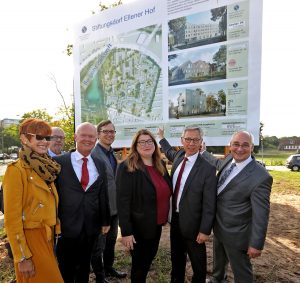 Since February 2017, the houses of Chiemgauer Holzhaus have been awarded the RAL quality mark GZ 425. The solid wood houses achieve a GWP (Global Warming Potential) value of less than zero in their carbon footprint. This was tested by the "Gütegemeinschaft CO2 neutrale Bauwerke in Holz e.V.".
Since February 2017, the houses of Chiemgauer Holzhaus have been awarded the RAL quality mark GZ 425. The solid wood houses achieve a GWP (Global Warming Potential) value of less than zero in their carbon footprint. This was tested by the "Gütegemeinschaft CO2 neutrale Bauwerke in Holz e.V.".
Taking into account all the necessary materials, such as concrete foundation, roof tiles, glass windows, etc., this means in the case of a solid wood house with approx. 150 m² of living space an CO2 reduction capacity of approx. 23,000 kg!
By comparison, a conventionally built house with bricks and otherwise the same conditions pollutes the environment with 24,000 kg of CO2. (Source: www.chiemgauer-holzhaus.de/
Certification of CO2 neutral solid wood buildings
Every building generates a verifiable "Global Warming Potential" (GWP) during the production of the building materials and during construction, which is primarily caused by the energy consumption during production. The aim of the new quality association is to certify solid timber buildings whose manufacturing energy balance has a GWP value of less than zero. This means that a manufactured solid wood building is at least CO2 neutral, or even has a CO2-reducing effect. For this purpose, the "German Institute for Quality Assurance and Labelling" (RAL) approved the "Quality Mark CO2 Reducing Wooden Structures" in 2015, which is awarded by the "Quality Association CO2 Neutral Structures in Wood". The quality mark has a modular structure and currently includes Part A of the EPDs as a component and basis. As soon as further European-recognised and standardised product indicators are available up to the disposal of a material, the quality mark will be extended with the same criteria in order to ensure a holistic view.
The basis of the "Quality mark for CO2-reducing timber structures" is timber from sustainable forestry. The more wood is used in construction and the more trees are replanted accordingly, the greater the CO2 reduction in our climate, both in the short and long term. The prerequisite for the award of the quality mark is the calculation and documentation of the EPDs as well as external monitoring according to the strict criteria of RAL.
INFOS:
Quality Association for CO2-neutral Buildings in Wood e.V., Munich
Internet: www.wood-co2.eu
RAL Guideline (June 2015): www.wood-co2.eu/file/co2-senkende-holzbauwerke-guetesicherung-ral-gz-425_cf941.pdf
Keywords:
DE-News, Wood construction, Climate protection, Certification & Labels, Life cycle assessment

